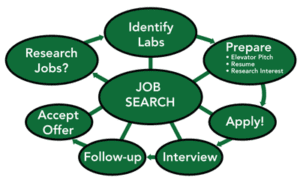 In part 1 of this series, we discussed landing an interview. Now what?
In part 1 of this series, we discussed landing an interview. Now what?
Many professors first Skype with prospective candidates before inviting them for an interview. It is highly recommended that you have an in-person interview before you join a lab—you want to have the chance to see if the lab and its environment are a good fit for you. Remember that once you have been invited for an interview, it really is about both sides evaluating each other.
When Interviewing
Interviews usually take a whole day, which includes your job talk, meetings with members of the lab and other faculty in the department, and lunch and/or dinner (usually with the lab). It’s always helpful to research the people you will meet with, if this is known to you.
- Ask about previous postdocs who have been in the lab, and request to talk to them. It is helpful to know if their postdoctoral experiences reflect what you are looking for, and they are likely to be open about their experiences.
- Try to get a sense of how the lab will change over the next year—given the relatively short half-lives of graduate students and postdocs, it is possible the lab you join will be quite different from the lab you interview at.
- Also get a sense of the department you will be situated in, particularly if you are interviewing in a small lab. Helpful colleagues are an important part of the postdoctoral experience and can counter the isolation that one can experience during one’s postdoc years. Many of these become collaborators for life.
Things to Explicitly Discuss with the PI
Just like with a PhD advisor, it is always worth having a chat with your potential postdoctoral mentor about expectations. Some things to ask are: What are their publication expectations from postdocs? Does their training style align with your expectations about mentorship? Would they support your efforts to develop the particular skills and expertise you want to pick up? How supportive are they of trainees carrying their work with them when they start a lab of their own? If you are interested in teaching opportunities, are they available?
Practical Considerations
It is helpful to ask about the institution’s policies for postdocs. In most places, postdocs occupy a nebulous intermediate between students and faculty, which can have practical repercussions on things like taxes, long-term visa status, healthcare, and retirement benefits. Many of the things graduate students take for granted no longer apply to postdocs (in many cases, this includes access to the university gymnasium, university counseling services, etc.). International students would do well to ask about the university’s visa policies for postdocs and talk to other postdocs about how this works across universities.
Once you’re done, remember to follow up with the lab or PI over email to thank them for the opportunity. Offers are sometimes made on the spot, and sometimes after few days over email or the phone. If you get an offer and are asked to sign an offer letter, you may be able to negotiate certain things like salaries and moving expenses; remember that it usually doesn’t hurt to ask once an offer has been made, even if the answer is no.
Interested in a career related to education? Check out these websites and opportunities:
The Chronicle of Higher Education
Inside Higher Ed
Genetics Education & Engagement Fellowship
